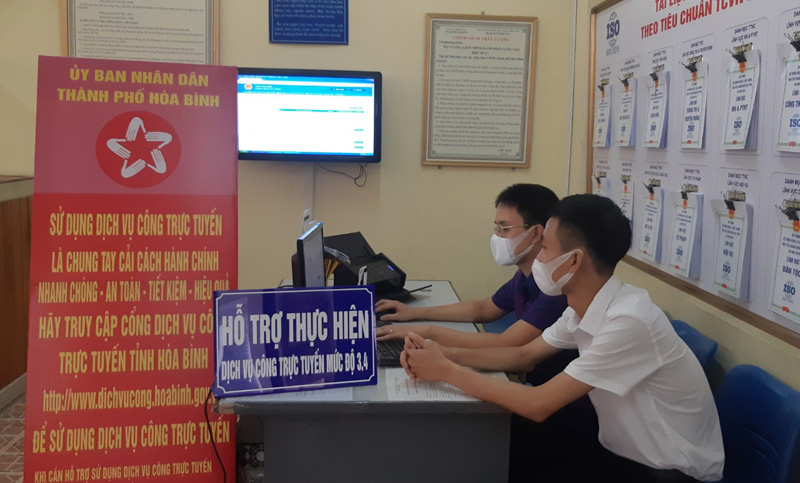
(HBO) - During its development process and the 2015-2020 tenure, Hoa Binh city has affirmed its role and position as a political, administrative, socio-economic and cultural centre and a driver for economic growth of the province. With a high political determination, the city’s Party organisation has focused on directing the successful implementation of targets and missions set by its previous congress.
 Hoa Binh city speeds up administrative
reform.
Hoa Binh city speeds up administrative
reform.
The merger of Ky Son district with Hoa Binh
city is a strategic mission helping the city to develop further. After the
merger, the city has 10 urban wards and nine rural communes. Its apparatus and
personnel contingent have been consolidated, and urban areas have recorded
important changes. The economic structure has shifted along the set direction,
with the services, industry and construction sectors accounting for 92.7
percent, and the agro-fishery-forestry sectors only 7.3 percent. State budget
collection in 2020 is estimated at 580 billion VND, per capita income at 70
million VND, and the poverty rate reduces to 1.47 percent. At present, seven
out of nine rural communes have been recognized as new-style rural areas. The
city is striving to have Hop Thanh commune earn the title of advanced new-style
rural area and Yen Mong commune a model new-style rural area within this year.
In the first nine months of this year, the
city focused on mobilising resources to work on the dual targets of COVID-19
prevention and control and socio-economic development. Many targets have been
fulfilled or surpassed, including total retail sales and services revenue
exceeding 12.5 trillion VND, up 16 percent year on year and fishery output
reaching nearly 1,000 tonnes, up 11 percent. The yearly targets on State budget
collection, job creation and afforestation have already been completed.
The achievements have created a foundation
and momentum for the city’s development in the next period towards the goal of becoming
a tier-II urban area before 2025. The city is taking measures to carry out the
resolution of its Party organisation congress./.
The Standing Board of the Hoa Binh provincial Party Committee has agreed in principle on a proposal by the Standing Board of the Party Committee of Hoa Binh city to gather feedback on the city’s 1:2000 zoning plan, which forms part of its broader urban development strategy.
Hoa Binh province has made notable progress in public administration reform and digital government development, with the satisfaction index among citizens and businesses reaching over 84%, according to recent government evaluations.
Thanks to great efforts by local authorities in recent times, the governance and public administration performance of Mai Chau district has been significantly improved.
In the afternoon of June 6, the Party Committee, the People's Council, the People's Committee and the Fatherland Front of Lac Son district solemnly held a meeting to celebrate the 139th anniversary of the district's founding (1886–2025) and the 79th anniversary of the establishment of the district's Party Committee (1946–2025). There was the attendance of Mr. Bui Van Thang, the Vice Chairman of the Provincial People's Council; Mr. Quach Tat Liem, the Vice Chairman of the Provincial People's Committee; Ms. Dang Bich Ngoc, the Deputy Head of the National Assembly Delegation of the province; as well as the former leaders of the province and district through various periods, who are the natives of the district.
Implementing the Politburo’s Resolution No. 57-NQ/TW on breakthroughs in science – technology, innovation, and digital transformation is a golden opportunity for the northern mountainous province of Hoa Binh to renew growth model, improve competitive edge and shorten digital gap.
Resolution 57-NQ/TW, issued by the Politburo on December 22, 2024, identifies sci-tech, innovation, and digital transformation as strategic breakthroughs to build a developed and prosperous nation. In Hoa Binh province, this spirit is not just a slogan, it’s being put into action through concrete initiatives that form a "new development triangle”: digital citizenship, digital economy, and digital administration.



 Hoa Binh city speeds up administrative
reform.
Hoa Binh city speeds up administrative
reform.